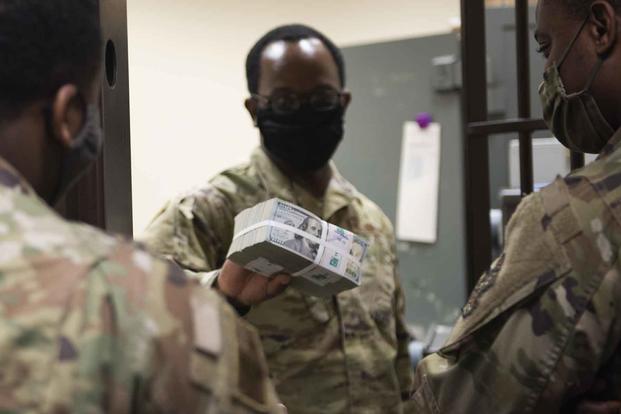The Pentagon says that it's finally ready to pay troops the "economic hardship bonuses" that Congress authorized last year to help offset rising prices and higher costs of living across the country.
But the sums troops will get seem unlikely to make a major impact, putting renewed attention on lawmakers to do more. A senior defense official told Military.com in an interview Friday that troops in the most junior ranks -- E-1 to E-3 -- will automatically see the bonus in their paychecks starting this month and going through December but, on average, they will be getting only $20 a month.
"The monthly bonus amounts, on average, will total approximately $120 [over the six months] ... and they're based on the funding Congress has made available," explained the official, who spoke with Military.com on the condition they remain anonymous.
Read Next: 'Today We Make History': Commission Probing Afghanistan War Starts Work with Veterans Top of Mind
Lawmakers on Capitol Hill, concerned that service member pay was not keeping pace with the private sector or inflation, included $43 million in the latest defense spending bill to provide the bonuses for anyone up to E-6 in rank.
Though Congress authorized the bonuses in December in the National Defense Authorization Act, or NDAA, it didn't provide funding for the benefit until late March, when lawmakers finally passed a bill to fund the Pentagon through the remainder of fiscal 2024, leading to the Pentagon's slow implementation.
The defense official explained that, broadly, the Pentagon took that appropriated $43 million and decided how many service members it could pay before the money ran out.
The result is that the bonus will go only to those up to the grade of E-3, not E-6 as allowed by law, and will benefit around 266,000 people.
"We chose the paygrades because of the amount of money that Congress appropriated and what we could pay and what would fit within that appropriation," the defense official said.
The official also noted that, even though service members receive two paychecks a month, the bonus will be paid at the end of each month.
"While it's welcome news that the department will provide some junior enlisted service members with temporary bonus pay, as authorized by [last year's] NDAA, more must be done," Justine Tripathi, a spokesperson for the House Armed Services Committee, told Military.com in an emailed statement, noting that this "is why the [upcoming] NDAA provides junior enlisted service members with a 19.5% pay raise."
In June, the House moved forward with a version of the annual defense policy bill that would give a huge 15% pay raise for E-1s to E-4s on top of a 4.5% increase for all troops. That proposal would mean junior enlisted troops would get a 19.5% pay raise next year.
Conversely, in June, the Senate unveiled a proposal to hike E-1 to E-3 pay by 5.5%, while service members of all ranks would get a 4.5% pay raise next year.
A bipartisan panel of lawmakers recently found after months of studying military quality-of-life issues that military pay has not kept pace with inflation or civilian paychecks.
The House and Senate will have to negotiate a compromise version of their respective bills before this year's NDAA can pass into law, and the prospect for the larger hike is murky.
The White House has raised strong objections to any targeted boost to junior enlisted pay before an administration study on military compensation is finished, which leads to questions whether the House's plan, along with its ambitious pay raise to junior troops, can survive.
Related: 5.5% vs. 19.5% Pay Raise: Senate Diverges from House on How Much to Boost Junior Enlisted Paychecks













